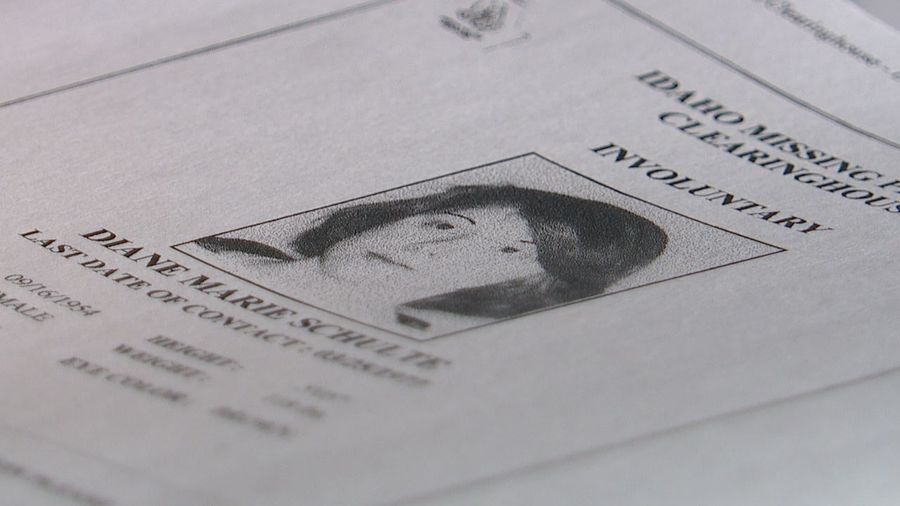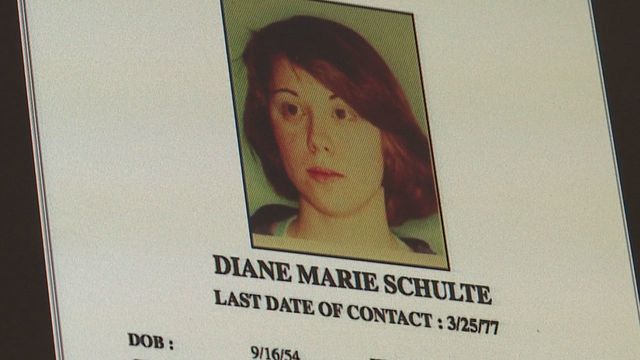
This is Part 2 of a three-part series on the missing persons case of Diane Schulte for Part 1 CLICK HERE, Part 3 CLICK HERE
Nampa resident Diane Schulte, 22, was reportedly last seen on March 25, 1977.
Her husband, Fred, comes home from work that evening to find his wife gone. He searches their house, their yard, the neighborhood. But finds no sign of her.
So he calls Nampa Police.
Diane was last seen wearing a blue-hooded sweatshirt, blue jeans, and yellow tennis shoes. They were the only clothes her husband notices missing.
A neighbor says she spotted Diane that morning, wearing those same clothes. But the neighbor tells investigators she did not see what direction Diane went. Another neighbor says the Schultes were a “devoted pair” who were “quiet and kept to themselves.” There are no reports of domestic tension.
The couple did not have children. Nor were they known to smoke, drink, or use drugs.
In fact, several friends and neighbors call them the “ideal” couple.
Police conduct a thorough investigation, checking with local cab companies, hotels, motels, hospitals, and even with the bus depot and the airports. No one reports seeing a woman matching Diane’s description.

The couple was financially stable. Diane had been an accounting major in college. She kept the couple’s books and “accounted for and kept track of almost every cent, incoming and outgoing,” according to reports. The couple had joint checking and savings accounts, and were expecting income tax return checks that would have required both signatures to be negotiated.
Nampa Police Detective Angela Weekes is now chief investigator on the Schulte case. In studying the forty-year-old files, she learned the missing woman was extremely “introverted, shy, quiet. She kept to herself.” So much so, “she was almost homebound,” Weekes says.
The woman did not have any friends in the area, did not associate with any of her neighbors, and apparently did not have any interest in becoming acquainted with any of her husband’s friends.
Diane’s only close friend was her grandmother in Flint, Michigan. “Diane usually called her grandmother once a week, and the grandmother made a return call at least once a week,” says a police report. “The last such call, as far as (anyone) knows, was on 3-24-77” the report says -- the day before Diane disappeared.
Diane was reportedly not close to her religious parents. An investigator learns the couple had “condemned her, allegedly for an incident in high school, where they believed she was running around with a married man. She had eventually run off to Florida with the man, but had returned home prior to starting college,” the report says.
Although she returns home, tension between Diane and her parents reportedly persists for years.
In contacting Diane’s grandmother, police learn the missing woman “had been highly upset and emotional” when the two had spoken on the phone the previous day. Reports, though, do not give details of the conversation or why Diane was agitated.
Police learn Diane’s parents had been planning to come to Idaho to visit their daughter and son-in-law later that year. Diane is purportedly upset over this, and encourages her husband to telephone her parents and convince them not to come. Fred says his wife “hates her mother and had been terribly hurt by her father.”
It is unknown if Fred ever made the call.

What’s more, police begin raising questions about the Schultes’ relationship. Something doesn’t seem right, but they can’t put their finger on it. “Co-workers said Fred didn’t talk much about his wife. And even co-workers from their hometown made the comments that he didn’t talk a lot about her,” Weekes says. “She didn’t come to a lot of his social events. But (the police reports) didn’t reference anything that they were having problems or that anybody was aware of any abusive situations.”
Police think: but could a possibly secret abusive relationship explain Diane’s reclusiveness?
“In domestic violence situations, isolation is a very effective tool to control somebody and to maintain that power and control. And when an abuser becomes fearful of somebody talking about the abuse, sometimes they act irrationally -- or the victim might choose to also leave that relationship,” Weekes explains. “But I don’t know if there was an abusive relationship here, because Diane didn’t talk to anybody.”
Undaunted and suspicious, Nampa Police detectives contact Fred again on April 1, 1977, and ask if he would take a polygraph test in relation to his wife’s disappearance. He agrees. The test is tentatively scheduled for the following week.
Then, two days later, the case takes a surprising –- and bizarre -- twist.
Early on the morning of April 3, the Washington County Sheriff’s Office receives a report of a dark blue 1975 Buick that has gone off the road and down an embankment along Highway 95, about three miles south of the town of Cambridge.

A DMV check shows the car is registered to Diane Schulte.
Deputies find a person dead behind the wheel. But it’s not the missing Nampa woman.
It’s her husband, Fred Schulte.
From all indications, Fred Schulte had been driving north on Highway 95 “at high speed,” when he evidently put his Smith & Wesson .38 to his right ear and pulled the trigger.
The car swerves off the highway and plummets down an embankment, coming to rest near railroad tracks.
The grisly suicide leaves investigators with a number of unanswered questions:
Why did Fred Schulte take his own life when he knew police were scheduled to question him -– yet again –- about his wife’s disappearance?
Was he somehow responsible for his wife’s possible demise? “There are some concerns that maybe he could’ve done something to her,” Weekes says.
Or was someone else responsible for Diane’s disappearance? And could Fred simply no longer live with the grief of suddenly losing the woman he claims he so dearly loved?
But when Nampa Police detectives later search the Schulte house, they discover two items that makes this cold case even more baffling.
PART 3: A murdered boy. A mysterious hole. And a strange, troubling letter -– from Fred Schulte.


